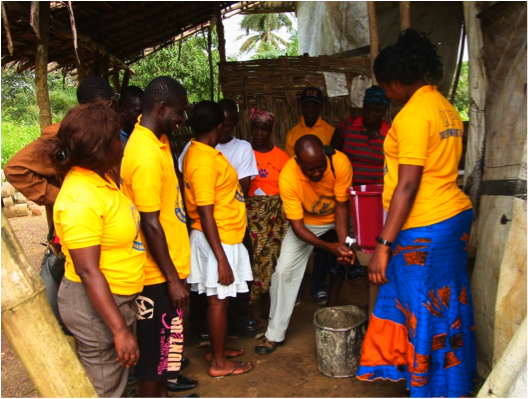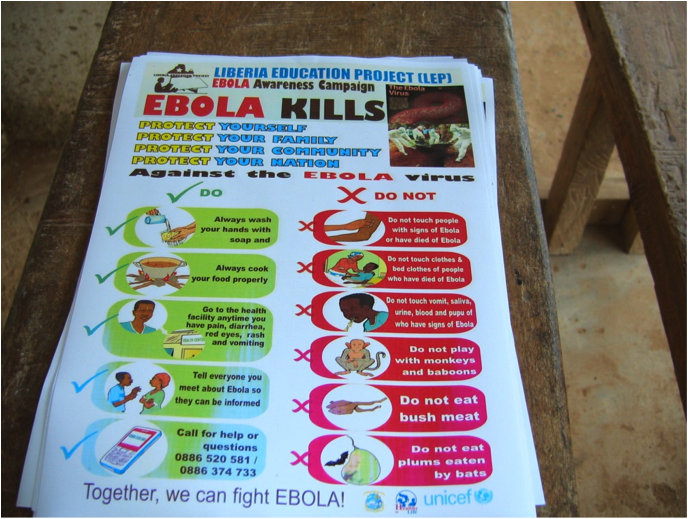Spreading awareness: The United Methodist Church in Somerton is sending funds to promote Ebola awareness in West Africa. Teachers from the church’s Liberia Education Project are now traveling to spread awareness of the virus, such as the importance of washing your hands and distributing informative fliers.
The historic Ebola outbreak has pushed a Northeast church to temporarily change its educational mission in Liberia to concentrate on battling the illness.
Because the small West African country’s schools are closed as Ebola is fought, the school the Somerton United Methodist Church is building in the nation’s interior is empty.
The teachers who work for the church’s Liberia Education Project, instead, have been trained by Liberia’s Ministry of Health and are now traveling around rural villages near their base of Ghenwein to spread awareness of the virus, said Dennis Fisher, the project’s chairman.
The World Health Organization said the three countries Ebola has hit hardest — Guinea, Sierra Leone and Guinea — have very weak health systems, lack resources and have only recently emerged from long periods of conflict and instability. According to the Centers for Disease Control, more than 3,000 people have died of the disease in those three countries. On its website, the CDC reports more than 7,000 cases in West Africa.
Those conditions make spreading information about Ebola even more important. Fisher and LEP’s executive director, Jacob Madehdou, said the country’s capital, Monrovia, has most of the people and most of the Ebola cases, but the country’s interior villages often are isolated. The church’s school in Ghenwein is about 140 miles from the capital.
Ebola affects victims first with fevers, sore throats, headaches and muscle aches. It can look like cholera, typhoid or malaria. As patients near death, they begin to bleed internally and externally, through their noses and ears. Symptoms can be seen within two to 21 days.
The Somerton church and others are sending funds to promote Ebola awareness, Fisher told the project’s supporters in an email last month. Fisher and Madehdou were in Liberia months before the outbreak began in the spring.
Ebola, named for a river in the Congo, usually has been confined to Central Africa, which is why an outbreak in West Africa is considered so unusual, according to the Associated Press. It was first called Ebola haemorrhagic fever. It has been increasingly in the news, especially since a man who recently returned to Texas from Liberia now has Ebola.
Ebola first appeared in two simultaneous outbreaks in 1976 in the Sudan and the Democratic Republic of Congo. The disease is transmitted to people through wild animals, but almost always spread by human-to-human contact, according to the World Health Organization, and it is fatal in 50 percent of the cases. WHO believes fruit bats are the most likely natural Ebola virus hosts.
The disease is not spread by casual contact, but it can be spread in ways that might seem unusual. Contact must be direct — through broken skin or mucous membranes — with blood, secretions, organs or other bodily fluids of infected people, and with surfaces or materials like bedding or clothing contaminated by the bodily fluids of infected people.
If mourners touch the body of a person who has died of Ebola, they could become infected. People remain infectious as long as their blood and body fluids, including semen and breast milk, contain the virus. Men who have recovered from Ebola can transmit the virus through their semen up to seven weeks after recovery.
Donations to the Liberia Education Project can be made through PayPal. Visit www.liberiaeducationproject.org, or through the U.S. Mail, care of the Somerton United Methodist Church, 13073 Bustleton Ave., Philadelphia, PA 19116. ••

Spreading awareness: The United Methodist Church in Somerton is sending funds to promote Ebola awareness in West Africa. Teachers from the church’s Liberia Education Project are now traveling to spread awareness of the virus, such as the importance of washing your hands and distributing informative fliers.





